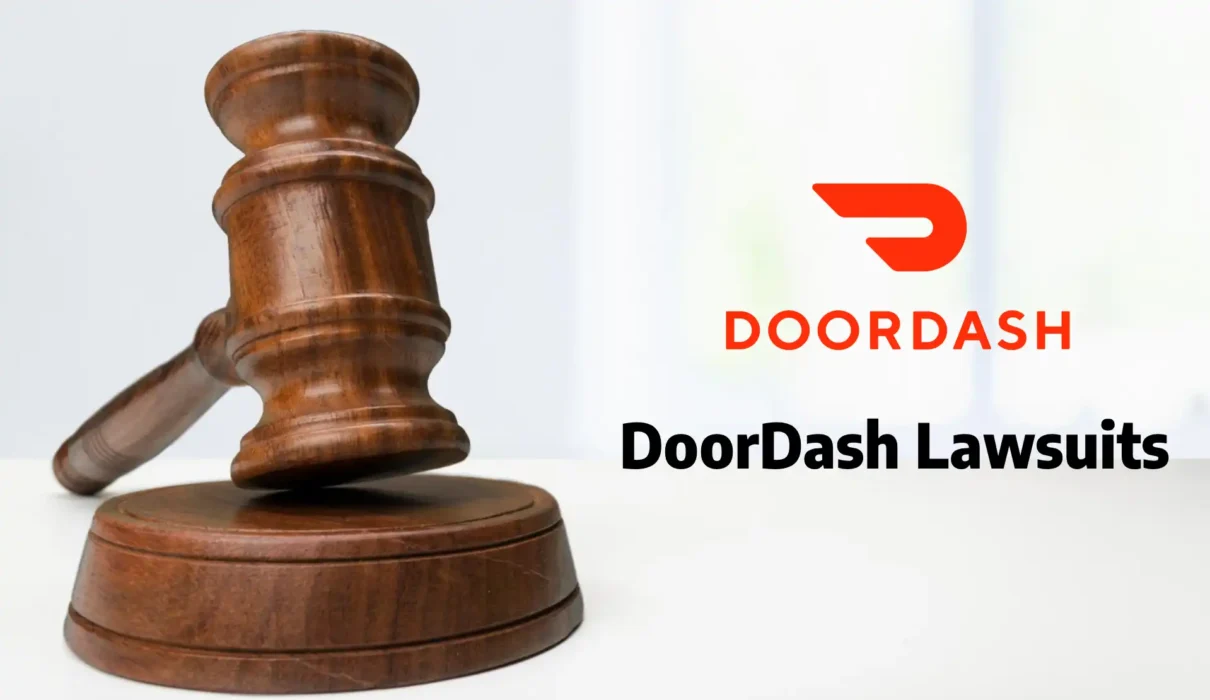When you don’t feel like going out, DoorDash is a great option for quick food delivery. It uses reputable drivers, offers up-front delivery pricing, and provides you with options for nearby restaurants. That doesn’t mean it hasn’t occasionally encountered issues. These problems have given rise to particular actions involving the district court, law enforcement and even politicians.
DoorDash has been the target of numerous lawsuits. Drivers, restaurants, law enforcement, consumer protection agencies, and customers filed a DoorDash lawsuit. This blog post provides you detailed information about DoorDash and types of DoorDash lawsuits.
DoorDash
DoorDash is a technology platform which connects consumers seeking food delivery services with local businesses. It operates in many cities, providing convenience and brings nearby restaurants within the reach of consumers who may not have had easy access in the past.
Customers believed in DoorDash because of its convenient services. On the basis of its business practices the company has faced legal issues. One of the major legal issues was classification of the DoorDash drivers, or Dashers as independent contractors as opposed to employees. Many other lawsuits have been brought against the company as a result of this classification.
DoorDash had settled a class action lawsuit in the year 2017 alleging that drivers were incorrectly classified as independent contractors by the company. DoorDash agreed to pay the drivers $3.5 million as part of the settlement and an extra $1.5 million in case the company went public or doubled its valuation. Additionally, DoorDash has been accused of collecting unstated delivery fees, which consumers claimed that it was not openly stated in the app.
In the meal delivery sector, they have a significant market share and continue to grow their business. DoorDash had put an effort into handling these legal issues. If the gig economy evolves, DoorDash may adopt a different strategy for handling legal issues and managing staff.
Different DoorDash Lawsuits
Misclassification of workers
One of the most common types of DoorDash Lawsuit is alleging that its drivers were improperly classified as independent contractors rather than employees. The business evades in offering some perks and protections required by state labor laws by using this mislabeling. A lot of plaintiffs from Illinois, California, and Massachusetts have recently brought class action lawsuits against DoorDash alleging worker misclassification.
Data Security Breach
Another DoorDash Lawsuit is about data security breaches. The company announced a data breach in September 2019 that had shown its impact on around 4.9 million people, including customers, drivers, and retailers. Hashed passwords and personal data like names, email addresses, delivery addresses, and phone numbers were exposed. According to the investigations, the issue occurred as a result of an unauthorized third party accessing the data.
Wage Theft and Unpaid Overtime
Wage theft and unpaid overtime are the reasons for another type of DoorDash lawsuit. The drivers argue that the company is not following the labor regulations of the state, which require that it pay overtime, minimum wage, mileage reimbursement, and in certain situations, 100% of tips. In November 2020, DoorDash agreed to pay $2.5 million to resolve a lawsuit in which the company was accused of defrauding drivers out of millions of dollars by utilizing a deceptive tipping methodology.
Notable Lawsuit Cases
In recent years, DoorDash faced several legal challenges. A few of these cases have led to substantial settlements or have shown problems with the company and gig economy. Accusations about DoorDash is exploitation of tips to subsidize driver wages led to a $2.5 million settlement in 2020 between the company and the Attorney General of Washington, D.C. This lawsuit addressed the tipping procedures of the company and ended a longstanding issue.
A class action lawsuit alleging DoorDash charges which are unstated delivery costs is another notable case. According to the lawsuit, the online meal delivery service actively markets flat, low-cost delivery prices but hides some of its fees under a line item labeled “fees and estimated tax.”
A wrongful death lawsuit regarding an accident that involved a DoorDash driver in October 2020 has been filed against DoorDash additionally with the other cases. Multiple lawsuits have been brought against the meal delivery service for accidents, deaths, and injuries caused by DoorDash drivers.
A class-action lawsuit alleging that DoorDash’s drivers were incorrectly classed as independent contractors was settled in 2017. Million dollars of significant compensation were made to the drivers who were involved in the settlement.
Implications for Gig Economy
DoorDash Lawsuits have an impact on the gig economy as a whole and have consequences that go beyond the company. The foundation of the business models employed by gig economy companies like Uber, Instacart and Lyft is put in doubt by lawsuits like the one that was settled in 2017 which alleged that DoorDash drivers were incorrectly classified as independent contractors.
These companies rely on classifying their employees as independent contractors in order to evade offering benefits and protections at the employee level. Their activities are constantly threatened by legal challenges like the Massachusetts lawsuits involving DoorDash, Instacart, Uber, Lyft, and others.
Regulations are also developed to control the gig economy. As an illustration, California passed Assembly Bill 5 (AB5), which imposes more stringent requirements for designating employees as independent contractors. Even though AB5 was avoided by gig economy companies like Uber, Lyft, and DoorDash thanks to the passage of Proposition 22, other states are still debating laws that might have an effect on these companies.
Furthermore, the future of the gig economy is greatly influenced by worker advocacy and public opinion. Companies may reevaluate their strategies to protect their brand identity and avoid legal risks as more employees and customers become aware of issues with worker classification and pay structures.
Conclusion
Finally, DoorDash lawsuits serve as a reminder on how critical it is for the gig economy to maintain transparency and fair compensation. As it expands, DoorDash will likely come under further scrutiny and to remain in compliance with the law and to maintain the public trust, it will need to modify its practices.

